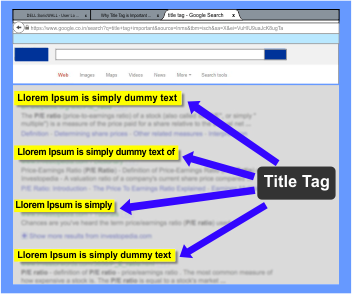Date Published: 7-Jul-2014 | By: Nancy R Jones
A good title tag is like a signboard on a busy highway. A clear sign board will guide the driver in the right direction. Similarly, a relevant, descriptive and attractive title tag attracts visitors and encourages them to click and visit your web page where they find the information they are looking for. A well written title tag stands out from dozens of web pages that appear on search engines.
 What is a title tag?
What is a title tag?
Technically, a title tag is a title element that defines the title of a web page. It is a crucial element of your on-page Search Engine Optimization (SEO). It is a link text that appears in search engine result pages (SERPs).
Title tag is an important factor used by search engines to identify the content of the website and to decide whether the site is worth listing in search results when a user is searching for information using a specific keyword.
Importance of title tag
- Tells the user what the page is all about: The page title clearly states what the page is about and based on the title’s information, the user can decide whether it is relevant to his query or not. If the title is relevant to his query, he clicks and visits your web page.
- Increases click through rate: By keeping the title brief, descriptive and by incorporating important keywords, you will be able to attract users. The title of the web page is one of the most crucial elements that will not only improve click through rate, but also the user experience.
How to write a good title tag?
- Descriptive and relevant: Create a unique, descriptive and relevant title tag for each page of your website. The title should concisely and adequately describe the contents of the page.
- Title tag length: The length of the title tag should not exceed 60 characters, including spaces or 512 pixels wide. If the title is too long, Search Engines will cut off the title tag. There are 95% of chances that a full title will appear if you write title of 55 characters.
- Important keywords: By including the important keywords in the title, you will be able to attract users searching for the information you are providing. Use the important keywords in the descending order – most important ones will come first.
- Leverage Branding: Include your brand name either at the beginning or at the end of the page title.
- Make it appealing: Use words like ‘How to’, ‘5 ways to..’ , etc., in your title that appeal to the readers.
What to avoid when writing title tags?
- Don’t reuse: Title tags should be unique, descriptive and concise for each page of your site. For example: In a book, there will be many chapters with unique titles, if all the titles are same, nobody will like to buy or read the book, the same applies to the web pages of a site, the title tag should be unique.
- Avoid keyword stuffing: It is advisable, not to use keywords or phrases multiple times in the title tag. This looks spammy to the search engines as well as the users.
- Others:
- Don’t use vague or default titles
- Don’t write lengthy titles
- Don’t write title that is not relevant to the page
Why and when Google will ignore your title tag in search results?
Google will consider your title tag only if
- Its length is between 50 to 60 characters in a single line
- It is descriptive
- It is relevant to the query
If the above criteria are not met, Google will ignore your title tag and may use the following things for the title tag
- Page content
- Anchor text links pointing to the page
- Open directory project
